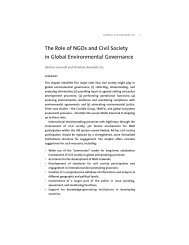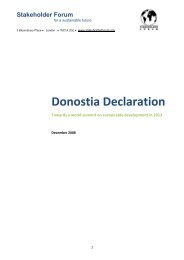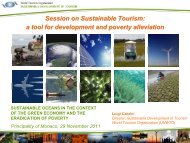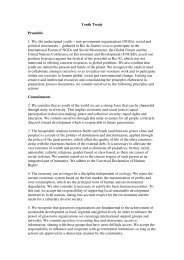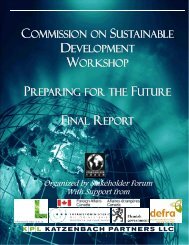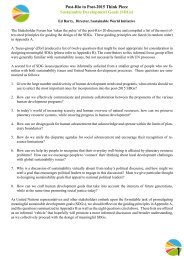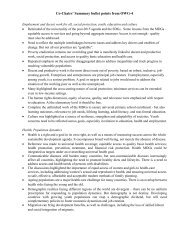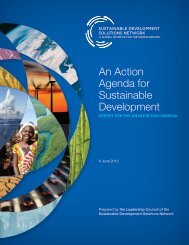BACKGROUND PAPER on United Nations Development Programme (UNDP ...
BACKGROUND PAPER on United Nations Development Programme (UNDP ...
BACKGROUND PAPER on United Nations Development Programme (UNDP ...
You also want an ePaper? Increase the reach of your titles
YUMPU automatically turns print PDFs into web optimized ePapers that Google loves.
esp<strong>on</strong>ses are at the heart of the <strong>UNDP</strong> mandate for poverty eliminati<strong>on</strong> and<br />
democratic governance.<br />
<strong>UNDP</strong> is also mainstreaming the crisis preventi<strong>on</strong> perspective into all of its<br />
development work through policy dialogue, staff training and knowledge networking.<br />
Why and when we get involved<br />
Today, 90 percent of deaths in wars are civilian, 11 milli<strong>on</strong> refugees are seeking<br />
protecti<strong>on</strong>, and there are 20 to 25 milli<strong>on</strong> internally displaced pers<strong>on</strong>s around the<br />
world.<br />
In September 2000, at the <strong>United</strong> Nati<strong>on</strong>s Millennium Summit, world leaders<br />
unanimously endorsed a set of internati<strong>on</strong>al development goals, including the<br />
overarching goal of halving the proporti<strong>on</strong> of people living in extreme poverty by<br />
2015. Reaching those goals, however, will require greater attenti<strong>on</strong> of the<br />
internati<strong>on</strong>al community to issues of crisis preventi<strong>on</strong> and recovery.<br />
<strong>UNDP</strong> supports these goals with its partners and other UN agencies by<br />
strengthening coordinati<strong>on</strong> mechanisms to:<br />
(1) work together more effectively with nati<strong>on</strong>al governments, agencies, d<strong>on</strong>ors<br />
and other aid partners;<br />
(2) prevent a crisis, mitigate natural disasters, resp<strong>on</strong>se planning and transiti<strong>on</strong><br />
to recovery;<br />
(3) reinforce in-country cooperati<strong>on</strong>;<br />
(4) support resource mobilizati<strong>on</strong>;<br />
(5) develop nati<strong>on</strong>al capacities to reduce the c<strong>on</strong>tinued impact of residual<br />
weap<strong>on</strong>s, such as land mines, <strong>on</strong> social and ec<strong>on</strong>omic infrastructure and<br />
livelihoods;<br />
(6) strengthen and implement policies and programmes that incorporate c<strong>on</strong>flict<br />
preventi<strong>on</strong> and peace-building perspectives;<br />
(7) support strengthening of justice, the rule of law and human security; and<br />
(8) support demobilizati<strong>on</strong> and reintegrati<strong>on</strong> of ex-combatants in order to protect<br />
civilians from post-c<strong>on</strong>flict errupti<strong>on</strong>s and to reduce the impact of illicit small<br />
arms proliferati<strong>on</strong> and availability.<br />
Where we help<br />
The c<strong>on</strong>tinued presence of <strong>UNDP</strong>, before, during and after crisis, puts it in a unique<br />
positi<strong>on</strong> to support crisis preventi<strong>on</strong> and recovery initiatives. As <strong>UNDP</strong>'s crisis<br />
preventi<strong>on</strong> and recovery arm, BCPR works in over 60 developing countries and<br />
stands ready to resp<strong>on</strong>d to emerging c<strong>on</strong>flicts and crisis situati<strong>on</strong>s.<br />
48




